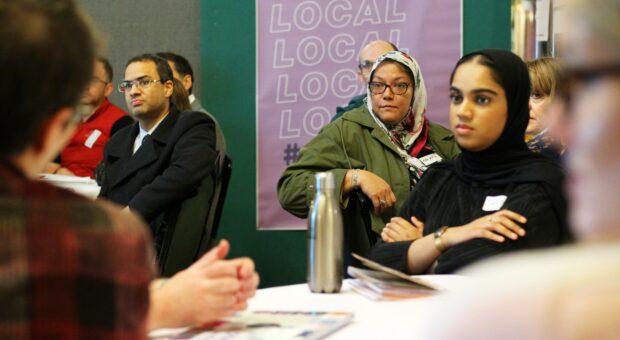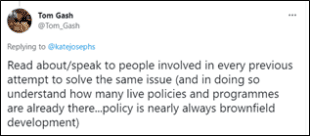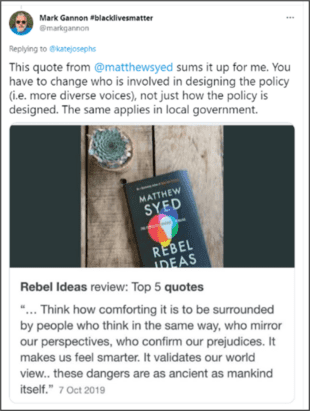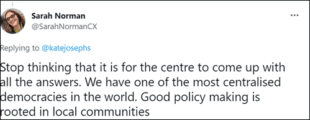
Twenty years ago I embarked upon a career in the civil service. From pensions policy, to public service reform, education and skills I dipped in and out of jobs which were described as ‘policy’ during my career. But increasingly I strayed from that anchor towards a focus on the intersection with delivery and implementation – cemented during my time in the Prime Minister’s Delivery Unit in the noughties – and moved towards increasingly operational roles. Rather than being explicitly recognised as a career path, that focus was driven from my own sense of frustration; the more I learned and saw, the clearer it seemed to me that policy is all well and good, but how it is interpreted and acted upon is what really matters.
In those two decades in national government I saw a welcome shift in the way we talk about policy making in the civil service - the language of delivery, systems thinking, user engagement, multi-disciplinary teams, design and iteration all began to take hold. And as this blog series shows that direction of travel is more than words in some notable areas – the work Janet Hughes and the Defra team are doing on Future Farming is a great example.
I now find myself in a very different world having swapped the ‘distant, ivory towers of Whitehall policy making’ for a role where I walk past the consequence of policy decisions every day, where engaging with communities isn’t just a ‘nice thing to do if there’s time’ but the heart of our work.
In this new world, despite having strong and established personal relationships, civil service colleagues feel distant. Despite knowing how it works intimately, the civil service ‘machine’ can feel confusing and obtuse. Despite trusting and believing in the capability and commitment of my former colleagues, I wonder if curiosity, humility, and space to iterate will be valued enough to become the rule rather than the exception.
How policy starts
Most of the challenges Government faces or questions it needs to answer are deeply complex; for a policy to have impact its delivery will involve a diverse range of actors in multiple overlapping systems – institutions and organisations; places; communities of profession and practice. It seems almost trite to point out that policy making in this context is going to be hard to get ‘right first time everywhere’ and so an adaptive mindset must be the goal – an approach to policy making that prizes feedback & learning; deep understanding of systems, places and people; the bravery to make space for co-production & iteration.
It’s instructive that I was asked to write this blog focusing on the way we ‘commission’ policy work. This highlights an immediate challenge - policy making in Government is still too often a linear process – an ‘event’ which starts within the Whitehall machine. The operating environment for policy makers is one where ministers or senior leaders ‘commission’ (or initiate) policy work – perhaps in response to evidence of need; perhaps in response to external pressures or a crisis; perhaps driven by a process like a spending review or political announcement. It goes without saying that it is the democratic role of the Government and its ministers to initiate policy, and that drive can play a key part in over-riding inertia and driving ambition. But without care, details of the policy risk being predetermined from the top down at the outset – by the way the core ‘question to be answered’ is framed, by constraints applied (time, cost, assumptions) and by expectations stated or implied.
Some would argue the operating environment for national policy making is fundamentally broken, but I’m not ready to go there just yet. Instead, I wanted to identify ways to move things forward within this context – how might we hack the linear policy making system? How might we change the way senior leaders commission policy work at the beginning of the process to drive better policy results? To help me in this task I took to Twitter and am grateful to all those who shared their views, the suggestions below shamelessly meld their ideas with my own (check out the original thread here).
Framing
 Great policy starts from absolute clarity about the change you are seeking to affect. Harvard professor Herman Leonard called this ‘Question Zero’ – starting, always, by asking ‘what, exactly, are we trying to accomplish?’ Its embarrassingly basic but I can think of too many occasions where pressures of time or a desire to deliver specific requests from ministers meant that I didn’t stop to answer this question with thought and thoroughness. The consequences for those outside Whitehall are frustrating and time consuming, a lot of energy is spent trying to divine why a policy is being taken forward and without that clarity others in the system are less able to engage and bring their own ideas to the table.
Great policy starts from absolute clarity about the change you are seeking to affect. Harvard professor Herman Leonard called this ‘Question Zero’ – starting, always, by asking ‘what, exactly, are we trying to accomplish?’ Its embarrassingly basic but I can think of too many occasions where pressures of time or a desire to deliver specific requests from ministers meant that I didn’t stop to answer this question with thought and thoroughness. The consequences for those outside Whitehall are frustrating and time consuming, a lot of energy is spent trying to divine why a policy is being taken forward and without that clarity others in the system are less able to engage and bring their own ideas to the table.- Taking the time to learn from what’s gone before and honestly and thoroughly understanding the current landscape in any policy area is surprisingly rare in Whitehall. Again, this may be because it takes time and effort (knowledge management systems are still poor); ministers invariably also want their policies packaged as ‘new and innovative’. However - as Tom Gash says - ‘policy is nearly always brownfield development’. In commissioning policy are we willing to review lessons from history and properly survey the landscape? Are we willing to explicitly consider the cost of doing nothing, watering down or delaying action?
Listening
 A huge theme in the twitter thread centred on who is ‘in the room’ when policy is being made. Commissioners of policy – be they senior officials or ministers – have the power to change expectations on this but need to be willing to listen not just to the powerful (or quotable) but those who have historically been missing from discussions. Recognising that it takes work to bring in diverse voices and to build the skills and trust necessary to really listen.
A huge theme in the twitter thread centred on who is ‘in the room’ when policy is being made. Commissioners of policy – be they senior officials or ministers – have the power to change expectations on this but need to be willing to listen not just to the powerful (or quotable) but those who have historically been missing from discussions. Recognising that it takes work to bring in diverse voices and to build the skills and trust necessary to really listen.- Policy design must include those impacted by the policy. I cannot think of a policy that doesn’t at some point seek to change or amplify human behaviour, so starting with an honest understanding of lived experience is critical. Historically this sort of engagement has been superficial or focused on ‘stakeholder management’ – telling rather than hearing. Doing this well puts a premium on development of excellent user research and ethnographic skills within the civil service, nested within multi-disciplinary policy design teams, but it also requires all civil servants to value considering diverse perspectives as part of their job.
- An ambitious approach would be to seek to listen not just to those who are impacted today but in the future, engaging young people on any policy that will affect their lives in coming decades.
 Finally, in seeking to engage and understand human behaviour as it relates to policies how might we begin to consider emotion? Clare Moriarty makes some really compelling points here on how contemporary scientific understanding of emotion should play a role in policy making, and a number of those responding to my twitter thread raised similar points. What if commissioners explicitly asked policy makers ‘how will it make people feel?’; a question that has been at the core of design thinking for an age but is rarely asked in Whitehall in my experience.
Finally, in seeking to engage and understand human behaviour as it relates to policies how might we begin to consider emotion? Clare Moriarty makes some really compelling points here on how contemporary scientific understanding of emotion should play a role in policy making, and a number of those responding to my twitter thread raised similar points. What if commissioners explicitly asked policy makers ‘how will it make people feel?’; a question that has been at the core of design thinking for an age but is rarely asked in Whitehall in my experience.
Challenging ourselves
 As a policy maker in national government I tried hard to think about subsidiarity, outcomes and complexity but from this new vantage in local government even my most sincere efforts to bust departmental siloes or engage with local partners feel insufficient. Those who commission policy simply must ask ‘what’s it got to do with us?’ and internalise the need to ensure the right decisions are taken at the right level, my colleague Sarah Norman, CEO of Barnsley Council, puts it more bluntly!
As a policy maker in national government I tried hard to think about subsidiarity, outcomes and complexity but from this new vantage in local government even my most sincere efforts to bust departmental siloes or engage with local partners feel insufficient. Those who commission policy simply must ask ‘what’s it got to do with us?’ and internalise the need to ensure the right decisions are taken at the right level, my colleague Sarah Norman, CEO of Barnsley Council, puts it more bluntly!- Equally there is something about how national government navigates complexity – there is a need here both to acknowledge and respect the inherent messiness of policy making whilst understanding that policy makers should strive for simplicity. To quote @rebecca fielding “no policy can cover every scenario. Enormous time and effort is wasted striving for this. Policy that works 90% of the time and allows flex for exceptions is HARD but critical”. Commissioners could ask ‘what’s the most straightforward approach that gets us the farthest distance’ and then genuinely allow for iteration and flexibility in partnership with those who deliver.
- A huge number of those who responded to my tweet spoke of the need for policy makers to take on operational roles and ensure policy makers’ career experiences include the reality of service delivery (there was also a lot of love for greater interchange between central and local government; which is something that a genuinely ambitious Places for Growth programme might actually seek to support?). Fundamentally this speaks to the need to answer the question ‘will it actually work?’ and embed that from the outset of all policy work. Implementation is much more central a consideration now in policy making than it was when I joined the civil service (I remember ‘consulting’ the operational arm of DWP on policy in one of my first jobs as if it were a stakeholder rather than part of the same team). However, commissioners need to build feedback loops, encourage policy makers to get out and see delivery in action and reward those who show a willingness to learn from experience on the ground.
A few weeks ago the Declaration on Government Reform was published. There are specific mentions for: multidisciplinary teams, evidence-led decision making and sharing data, public value, getting out of Whitehall, open collaborative policy-making, operating more seamlessly with institutions outside government, and building partnerships with the wider public sector, private sector and community organisations to secure the best outcomes for citizens. These are welcome commitments and in many ways map onto the suggestions I’ve made. The question, as ever, is whether they will be implemented. To do so requires all those who initiate policy work in national government – the most senior officials, ministers and their offices - to genuinely embrace different assumptions and questions from the start of that process. Speaking from the outside, I sincerely hope they will.
Join our community
We use this blog to talk about the work of the multidisciplinary policy design community. We share stories about our work, the thinking behind it and what policymaking might look like in the future. If you would like to read more, then please sign-up for updates. Join the conversation by commenting below.
5 comments
Comment by Gavin posted on
Thanks for sharing Kate. As the saying goes, vision without delivery is hallucination. There are some great books out there on the 'science' of delivery in Govt. Some are essential reading I'd say - for anyone in the civil service.
Comment by Andrew Knight posted on
Hi Gavin - if you've got any top recomendations then feel free to list them here...
Comment by Saika Javeed posted on
Excellent blog! Can't wait to hear more about this.
Comment by Kevin Oliver posted on
A Great blog. Policy without engagement and consideration of peoples needs is just box ticking, yet so many policies still seem to follow the well trod path. Thanks for showing the way to being imaginative and empathetic.
Comment by Andrew Knight posted on
Thanks for commnenting Kevin. DWP are doing some really foward thinking work in this area through their Policy Exploration team. Also for more like this read our statement on design.